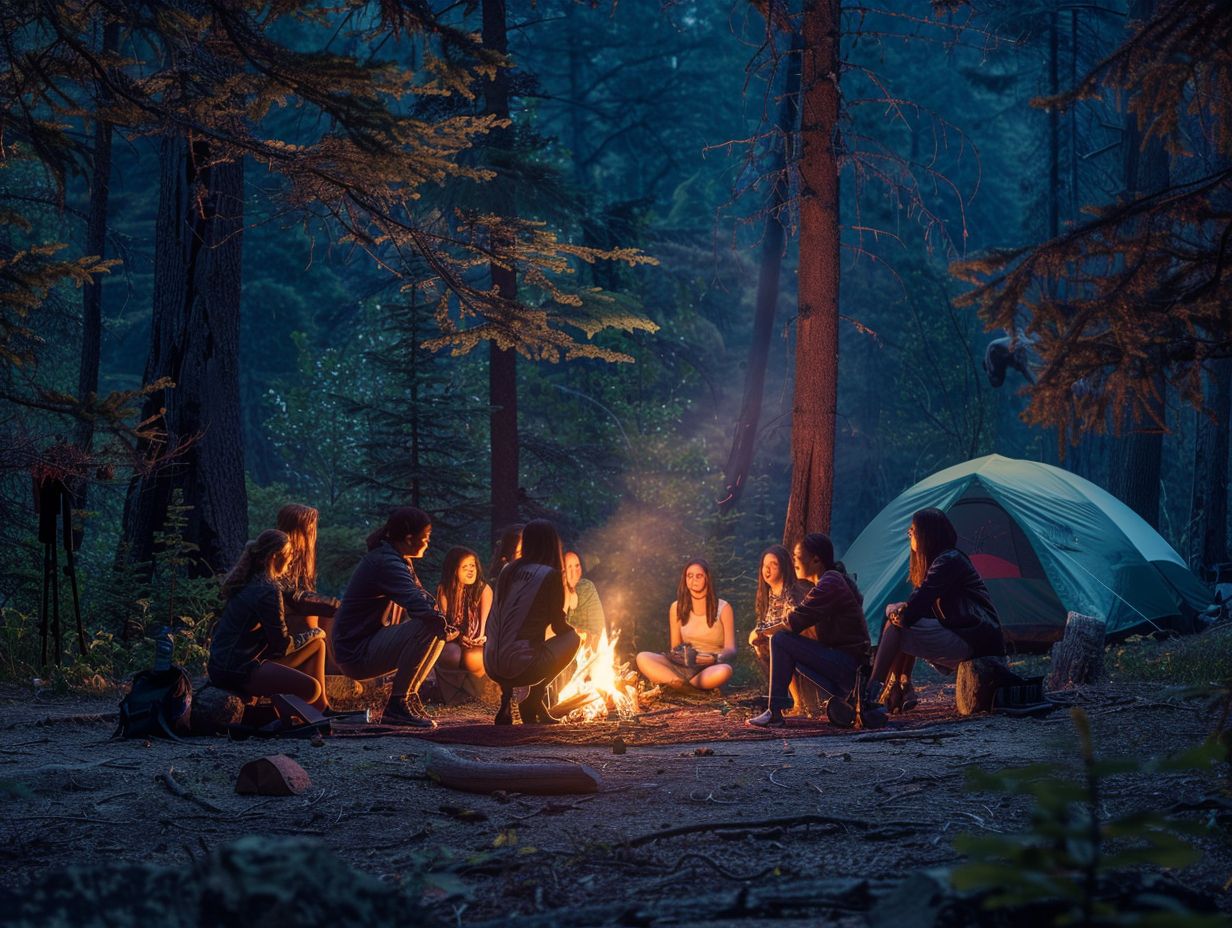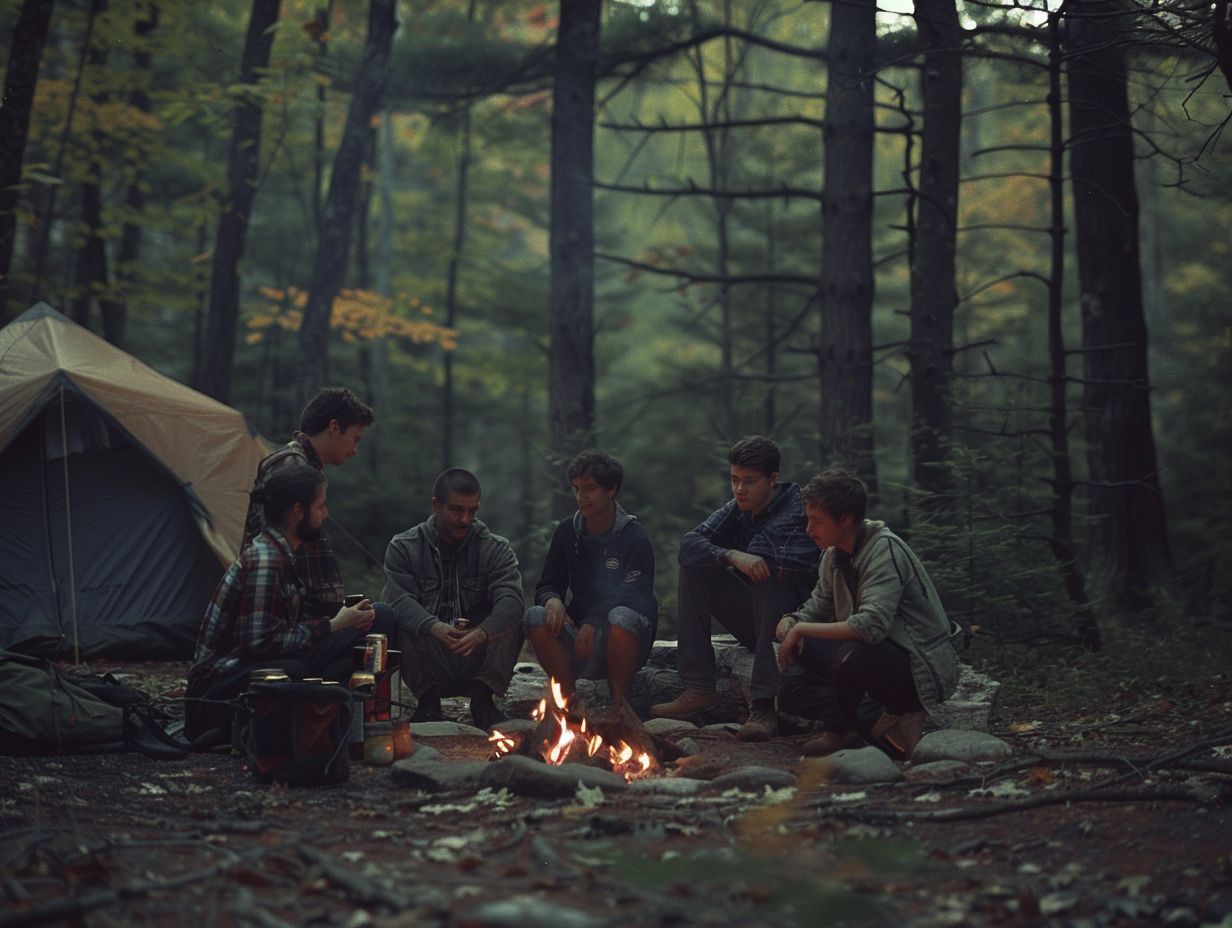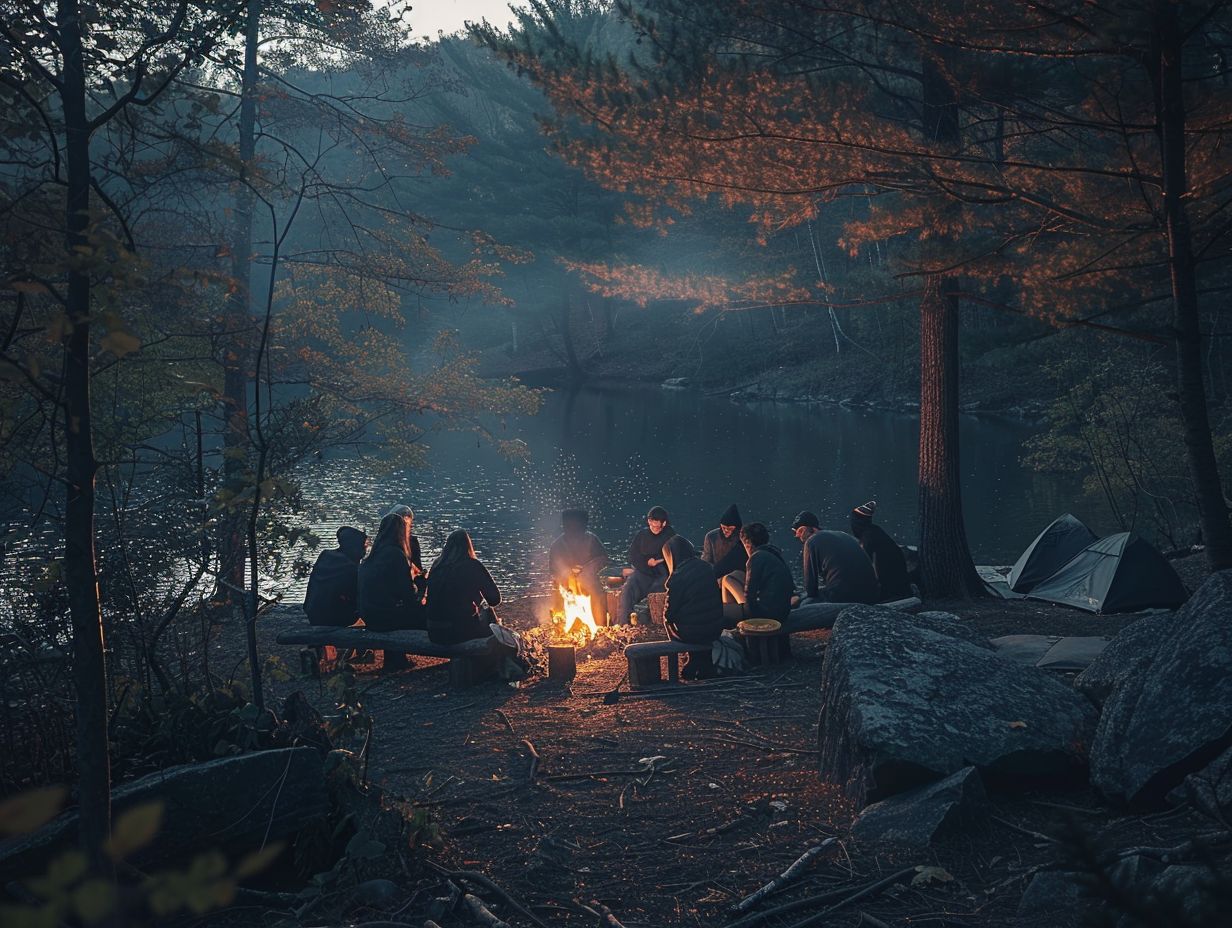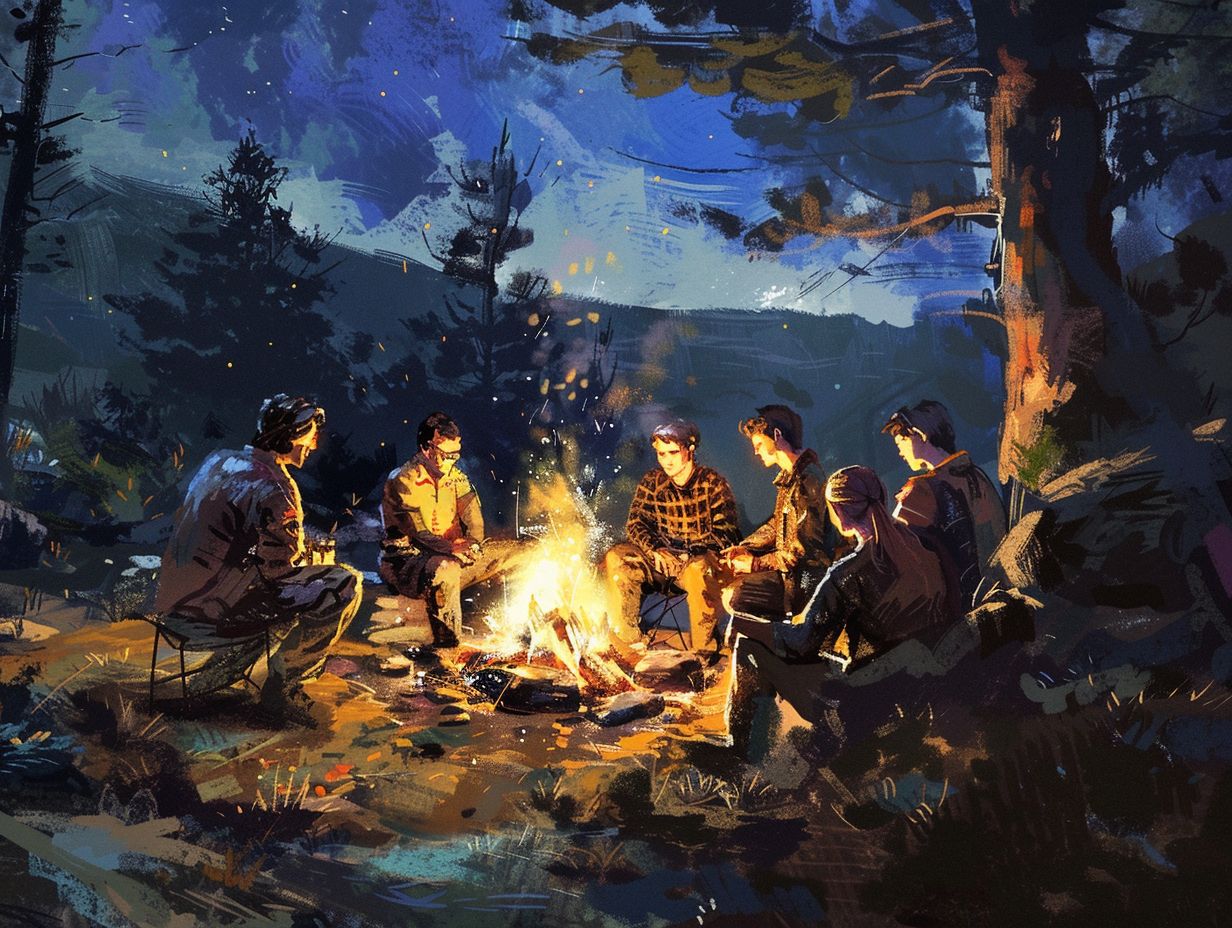Planning a camping trip with friends can be an exciting and rewarding experience, but it also requires careful preparation to ensure a smooth and enjoyable adventure. When you embark on this journey, consider factors like choosing the right location, packing essential items, and planning activities to make the most of your time outdoors.
This guide will explore helpful tips for planning a successful camping trip with friends, including essential items to bring, fun activities to do while camping, tips for first-time campers, and strategies for preparing for unexpected weather changes. So, as you prepare for your trip, gather your camping gear and get ready for an unforgettable outdoor experience!
Key Takeaways:

- Choose a suitable location that caters to everyone’s interests, abilities, and budget.
- Discuss and decide on the duration of the trip to ensure everyone’s availability and schedule.
- Plan activities and meals ahead of time to maximise fun and minimise stress during the trip.
1. Choose a Suitable Location
When planning a memorable camping trip with friends, selecting the perfect destination is crucial. Consider factors such as proximity to nature, available facilities, and the type of experience you wish to have.
Researching different camping locations can assist you in finding the ideal setting that aligns with your criteria.
For a tranquil getaway, selecting a remote mountain location with stunning views and hiking trails may be the perfect choice. Alternatively, if you prefer a beachside adventure, exploring coastal campsites that offer water activities such as kayaking or surfing could be ideal.
Urban campsites located near cities provide a mix of nature and convenience, allowing easy access to local attractions and restaurants for a comprehensive camping experience.
2. Decide on the Duration of the Trip
Determining the duration of your camping adventure is crucial for effective planning and scheduling. Whether you are planning a weekend break or a more extended wilderness expedition, establishing clear dates is vital for organising your trip efficiently.
When selecting trip dates, it is essential to take into account the availability of fellow campers or family members who will be participating in the expedition. Ensuring that everyone can commit to the chosen dates helps prevent last-minute changes or cancellations.
Seasonal factors also play a significant role in determining the timing of your camping trip, considering aspects such as weather conditions, insect activity, and the overall experience you seek in nature.
Short camping trips provide a quick retreat from the daily routine, while longer excursions offer a more immersive wilderness experience, allowing for a more comprehensive exploration of the surroundings.
3. Plan Activities and Meals
When planning your camping trip, enhancing the experience for both you and your mates can be achieved by incorporating engaging activities and delicious meals into your itinerary.
Whether engaging in activities such as hiking and fishing or enjoying the process of cooking over a campfire, creating a diverse and well-structured plan ensures that everyone involved has a memorable and enjoyable time.
For individuals seeking adventure, it is recommended to plan challenging hikes to scenic viewpoints or thrilling fishing excursions at nearby lakes. Alternatively, if relaxation is more appealing, consider bringing along items such as a book or sketchpad to enjoy the tranquillity of the surroundings.
Remember to pack essential items like sturdy hiking boots, fishing gear, and comfortable camping chairs for moments of relaxation by the fire.
In terms of meal planning, preparing easy-to-cook options like foil packet dinners or kebabs that can be grilled over the campfire is ideal. Additionally, ensure you have an adequate supply of snacks and ingredients for s’mores to enjoy a sweet treat while gazing at the stars in the night sky.
4. Divide Responsibilities
Assign roles and responsibilities within your camping group to promote teamwork and efficiency. Distribute tasks such as cooking, setting up camp, and organising supplies to ensure a smoother camping experience. Communication plays a vital role in this process, as clear instructions need to be given and understood by all members.
For example, one team member could be assigned the responsibility of meal planning and grocery shopping, while another could focus on gathering firewood and building the campfire. Thoughtfully dividing tasks ensures that everyone feels involved and valued.
By cooperating and sharing skills, you can enhance the overall camping adventure, creating a sense of camaraderie among the group.
5. Make a Packing List
Creating a comprehensive packing list is a crucial step in preparing for your camping trip. You should ensure that your list includes essentials such as tents, sleeping bags, cooking supplies, and personal items to avoid any last-minute stress.
Organising your packing list into categories can help streamline the process. Begin with shelter by confirming that your tent is sturdy and that all necessary poles and stakes are included.
Regarding clothing, it is advisable to pack versatile pieces that can be layered for varying weather conditions. Select lightweight, non-perishable food items that are easy to prepare. Hygiene products like biodegradable soap and toothpaste should not be overlooked to maintain freshness in the outdoors.
Additionally, consider incorporating multi-purpose items into your list to reduce the weight of your pack and maximise space efficiency.
6. Consider the Weather and Season
When preparing for your camping trip, it is crucial to check the weather forecast and take into account the season to anticipate outdoor conditions effectively. Dressing appropriately, ensuring you have the necessary gear, and making adjustments to your plans based on weather predictions are essential steps to guarantee a comfortable experience.
Your camping experience can be significantly impacted by the weather during different seasons. In the summer, it is important to be ready for high temperatures by packing lightweight and breathable clothing, as well as carrying an ample supply of water and sunscreen.
When camping in the autumn, be prepared for fluctuating temperatures by layering your clothing and bringing additional blankets for cooler nights. For winter camping, having appropriate insulation, such as a four-season tent and a warm sleeping bag, is essential to ensure your safety and comfort.
During spring camping, it is imperative to have waterproof gear in case of showers and to navigate muddy terrains effectively. Always prioritize safety by being able to identify and respond to weather-related risks promptly.
7. Budget and Expenses

When managing costs for your camping trip, it is essential to set a budget and estimate expenses beforehand. Take into account factors like campsite fees, food supplies, equipment hire, and any additional activities you intend to engage in.
Fixed costs, such as campsite fees, equipment hire, and permits, are consistent expenses that should be included in your budget planning. On the other hand, variable expenses like food supplies, petrol, and optional excursions can fluctuate based on your choices during the trip.
To save money while camping, consider cooking your meals over a campfire instead of dining out and bring reusable water bottles to avoid additional costs for bottled water. Additionally, sharing or borrowing camping equipment from friends can significantly reduce equipment hire expenses.
8. Plan for Transportation
Arranging transportation to and from your camping destination is a crucial step in ensuring a smooth and successful trip. Whether you opt for carpooling, renting a motorhome, or utilising public transport, the primary goal is to ensure everyone reaches the destination safely and punctually.
Carpooling presents a cost-effective option, allowing you to divide fuel expenses and decrease the number of vehicles on the road, while also fostering camaraderie among travelers. Renting a motorhome offers the benefits of convenience and comfort, with amenities akin to a home on wheels, although it may involve higher rental and fuel costs.
Public transport, on the other hand, is a sustainable choice and can be less stressful than driving, although it might restrict your flexibility in accessing more remote camping locations.
When strategizing your routes, it is important to consider factors such as road conditions, refueling stations, and alternative paths in the event of closures. Coordinating your travel logistics beforehand is key to avoiding any last-minute inconveniences during your camping excursion.
9. Check for Permits and Reservations
Securing any necessary permits and reservations for campsites or recreational areas is crucial to avoid last-minute disappointments. You should ensure that you book pitches, obtain permits for hiking or fishing, and confirm any activity reservations well in advance.
It is important to research the specific requirements for the area you plan to visit because regulations can vary from place to place. Some popular camping spots have limited availability and may require booking months in advance, especially during peak seasons.
Certain activities such as wild camping or boating may necessitate special permits to ensure safety and conservation efforts. Always remember to review the rules and guidelines established by the park service or land management agency to demonstrate respect for the environment and wildlife while enjoying your outdoor adventures.
10. Safety Precautions
Prioritising safety measures during your camping trip is crucial to protect yourself and your friends. From basic first aid knowledge to wildlife awareness and fire safety practices, being prepared can prevent accidents and emergencies.
It is important for you to familiarise yourself with the area’s potential hazards such as extreme weather conditions, rough terrain, and poisonous plants. Always inform someone of your camping location and itinerary before heading out, so they can raise the alarm if you fail to return on time.
Carrying essential supplies like a fully stocked first aid kit, extra food and water, and navigation tools can be a lifesaver in case of getting lost. Remember to practise Leave No Trace principles to minimise your impact on the environment and stay alert for signs of approaching wildlife.
11. Plan for Emergencies
Having a well-thought-out emergency plan is essential for handling unexpected situations during your camping adventure. You should prepare for scenarios like injuries, inclement weather, or getting lost to ensure a swift and effective response.
Communication strategies are vital in emergencies. You must ensure that all members of your group know where to meet in case of separation. Make sure everyone has the contact information for emergency services and designated emergency contacts.
Essential supplies should include first aid kits, extra food, water, and warm clothing. To stay calm, you should remember to take deep breaths, assess the situation calmly, and delegate tasks to team members. It is crucial to keep a clear mind as it can help navigate even the most challenging crisis scenarios.
12. Communicate and Coordinate with Everyone
Effective communication and coordination among friends are key to a successful camping trip. You should keep everyone informed about the itinerary, tasks, and any changes to ensure a smooth and enjoyable experience for all.
Encouraging open dialogue allows for transparent decision-making processes, where everyone’s opinions and ideas are valued. In times of conflict, you should promote active listening and empathy to find common ground and resolve disputes amicably.
Building teamwork and camaraderie can be fostered through team-building activities, shared responsibilities, and creating a supportive environment where each member feels appreciated. It is important to celebrate achievements together and offer constructive feedback to strengthen the bond within the group.
13. Respect Nature and Leave No Trace
Practising Leave No Trace principles and respecting nature are essential for preserving the beauty of outdoor environments for future generations. Minimising your impact can be achieved by adhering to guidelines on waste disposal, campsite selection, and wildlife interaction.
Regarding waste disposal, ensure you pack out your rubbish and bury human waste at least 200 feet away from water sources to help maintain the ecosystem’s balance. When selecting a campsite, it is recommended to choose established sites to prevent damage to fragile vegetation. Avoid approaching or feeding wildlife to ensure their natural behaviours remain undisturbed.
Engaging in sustainable camping practices, such as using reusable camping gear, avoiding single-use plastics, and minimising campfire impact by utilising established fire rings or camping stoves, can further mitigate your environmental footprint. By making conscious efforts, you can fully enjoy nature while safeguarding its beauty for generations to come.
14. Have Fun and Be Flexible

Approach your camping trip with a spirit of adventure and a willingness to embrace new experiences. Flexibility with your plans and a readiness to welcome unexpected moments can create memorable adventures and opportunities for bonding with your friends.
Imagine coming across a hidden waterfall while venturing off the beaten track, or spontaneously deciding to extend your stay at a picturesque campsite. These impromptu decisions often lead to the most enriching and unforgettable camping experiences.
Remaining open to diversions or spontaneous activities can infuse your trip with a sense of excitement and exploration, making it truly distinctive and filled with surprises.
15. Reflect and Share Memories
After your camping trip, take time to reflect on the shared experiences and create lasting memories with your friends. Sharing stories, photos, and lessons learnt can deepen your bond and inspire future adventures.
One way to capture these memories is by journaling about your favourite moments from the trip. Detailing the sights, sounds, and emotions you experienced can help you relive those special times.
Consider creating a scrapbook with mementoes like pressed flowers, ticket stubs, or even a map of the campsite. When you gather with your friends to reminisce, encourage everyone to share their highlights and reflections on what made the trip memorable. These group reflections can not only strengthen your connection but also offer different perspectives and insights.
What Are Some Essential Items to Bring on a Camping Trip?
When planning your camping trip, it is crucial to prioritize packing the necessary essentials for a successful outdoor experience. Make sure to include items such as a tent, a sleeping bag, cooking supplies, and appropriate clothing on your packing list to guarantee comfort and convenience during your time in the wilderness.
When selecting shelter, opt for a durable and easy-to-set-up tent from reputable brands like REI or Big Agnes to establish a cosy and secure home base. Additionally, ensure you have a high-quality sleeping bag from brands such as Marmot or The North Face to keep you warm throughout the night.
Regarding meal preparation, consider investing in a portable stove like the Jetboil Flash or the MSR PocketRocket to simplify the cooking process. Prioritize your safety by carrying a dependable first aid kit and a headlamp from trusted brands like Petzl or Black Diamond.
Remember to pack personal care items like biodegradable soap, a toothbrush, and sunscreen to maintain hygiene and protect yourself from the elements while enjoying your camping experience.
What Are Some Fun Activities to Do While Camping?
Camping offers a wide range of exciting activities for you to enjoy in nature. Whether you prefer hiking, stargazing, storytelling around the campfire, or fishing in nearby lakes, there is something for everyone to take part in and create lasting memories.
If you are seeking an adrenaline rush, engaging in activities like rock climbing, white-water rafting, or zip-lining can enhance your camping experience.
Alternatively, if you prefer a more relaxed approach, participating in morning yoga sessions, nature photography walks, or simply lounging in a hammock with a good book can be an ideal way to relax amidst the beauty of the great outdoors.
Furthermore, the dynamics of different group sizes can inspire various group activities, such as team-building exercises, scavenger hunts, or group cooking challenges over the campfire. These activities can encourage camaraderie and create memorable experiences for all participants.
How can you ensure that everyone is included in the planning process?
To ensure a coherent camping trip, it is essential to involve everyone in the planning process. Collaborate on decision-making, delegate tasks based on interests and strengths, and encourage open communication to ensure that all participants feel valued and included.
One effective strategy for inclusive planning is to conduct group meetings where each participant can share their ideas and preferences. Creating shared documents, such as Google Sheets or Trello boards, can also enhance collaboration and transparency in decision-making.
Soliciting input from all participants ensures that diverse preferences and opinions are respected and considered, fostering a sense of inclusivity and mutual respect among the attendees of the camping trip.
What Are Some Tips for First-Time Campers?
When venturing into camping for the first time, preparation and knowledge are crucial for a successful experience. Begin by choosing easy camping locations, packing lightly, practising setting up equipment beforehand, and acquainting yourself with basic outdoor skills for a seamless introduction to camping.
After selecting a suitable camping spot, take the time to plan your meals in advance to avoid any last-minute stress. Bring non-perishable food items, a portable stove, and utensils for convenient cooking. Safety measures should be a top priority, so ensure you carry a first aid kit, insect repellent, and a reliable communication device.
Additionally, be mindful of wildlife in the vicinity and securely store food to prevent any unwanted animal encounters.
How Can You Prepare for Unexpected Weather Changes?
During your camping trips, the weather can sometimes take unexpected turns, making it crucial to be prepared for sudden changes. Ensure you pack versatile clothing layers, have emergency shelter options readily available, stay updated on weather forecasts, and establish backup plans to effectively respond to varying conditions.
Maintaining flexibility during your outdoor excursions is vital for a safe and successful trip. When encountering shifting weather patterns, prioritise adaptability.
Consider modifying your planned activities based on the conditions – for example, opting for a hike rather than a swim in cooler weather or selecting a sheltered campsite in case of anticipated high winds.
Embracing the ability to make real-time decisions can enhance your overall experience and guarantee your comfort and safety throughout the journey.
Frequently Asked Questions

What are some important things to consider when planning a camping trip with friends?
When planning a camping trip with friends, it’s important to consider the interests and abilities of everyone in the group. You should also discuss budget, transportation, and camping location preferences. It’s also a good idea to establish a group leader or organizer to help keep things organized.
How can we ensure everyone in the group is prepared for the camping trip?
Before the trip, make sure everyone has a packing list and knows what they need to bring. You can also assign specific items for each person to bring, such as tents or cooking supplies. It’s also a good idea to have a group meeting to go over any important details and address any concerns.
What are some important safety tips for camping with friends?
When camping with friends, it’s important to have a first aid kit and know basic first aid skills. Make sure to have a plan in case of emergencies and to have a way to communicate with the outside world, such as a cell phone or satellite phone. It’s also important to follow all safety guidelines when setting up camp and using equipment.
How can we make sure everyone has a great time on the camping trip?
To ensure everyone has a great time, make sure to include activities that everyone will enjoy. This can be hiking, canoeing, fishing, or simply relaxing by the campfire. You should also encourage open communication and be open to compromise and suggestions from others in the group.
What are some tips for choosing a camping location with friends?
When choosing a camping location, consider the season, weather, and activities available in the area. It’s also important to check for any camping permits or reservations needed. You may also want to consider the amenities and facilities available at the campsite, such as bathrooms and water sources.
How can we handle conflicts or disagreements while camping with friends?
Conflicts and disagreements can arise during any trip, but it’s important to address them calmly and respectfully. Try to find a compromise or solution that works for everyone. If needed, take some time apart to cool off and then come back together to discuss the issue. Remember to communicate openly and try to see things from each other’s perspective.



